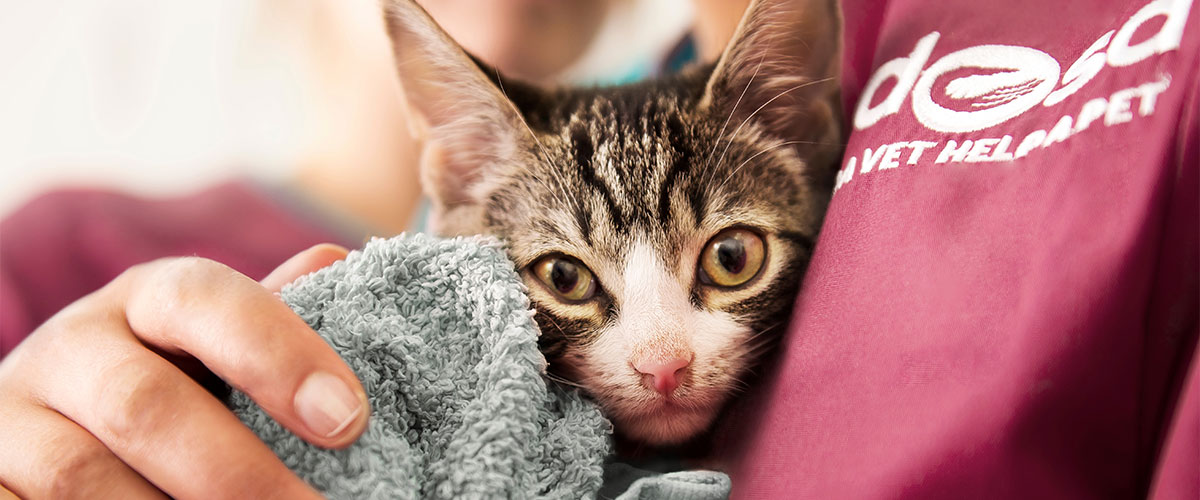Prevention is always better than cure – and there’s lots of things you can do to keep your cat happy and healthy.
It’s a good idea to give your cat a basic home health check every so often, alongside their trips to the vet. Once you know what’s normal for your cat, you’ll be able to spot any changes in their health. If you’re worried about anything at all, speak to your vet.
Preventative healthcare for your cat
Our vets’ recommend taking these simple steps to keep your cat’s health on track:
- Make sure you cat is always registered with a vet, in case of emergencies.
- Take out pet insurance to cover the cost of any unexpected vet treatment. PDSA Pet Insurance provides 5* cover – selected by our vets.
- Have them microchipped – it’s the best way of helping reunite you with your cat if they go missing.
- Get them vaccinated to protect them from really serious illness, like FeLV and cat flu.
- Neutering can protect them from certain diseases and help to keep them calm and happy.
- Treat them regularly for fleas and worms to stop infestations that could make them very poorly.
- Check them over for ticks, especially from late spring to early autumn.
- Groom them regularly. Longhaired cats will need much more grooming than shorthairs. Cats usually love the extra attention and it’s a great way for the two of you to bond. It’s also the ideal opportunity to check your cat over for any signs of illness or injury.
Grooming your cat
Cats are very clean and will spend up to half their day grooming themselves. They also use it as a way of bonding with each other – for cats, nothing says ‘I love you’ like a grooming session.
It’s a good idea to get your cat used to being groomed from an early age as part of their socialisation. Start off with really short grooming sessions to get your kitten used to being brushed. Gradually build up the time you spend grooming them until they’re relaxed and happy to be touched on all areas of their body, like their paws, ears, and stomach. Most cats quickly learn to love being groomed and really enjoy the extra attention!
- All cats need regular grooming but long-haired cats need more coat care than short-haired cats.
- Comb and brush a long-haired cat once a day.
- Brush a short-haired cat twice a week.
- Buy a brush and comb that are suited to your cat’s hair type. You can buy grooming tools on the PDSA Pet store.
- Regular grooming helps keep your cat’s coat in tip-top condition. If you notice any changes in their fur or if them seem itchy and uncomfortable, they might have skin allergies. Read our skin care advice for itchy and allergic pets.
Pedigree cats
Any cat owner is devastated if their feline friend gets seriously ill. Unfortunately, some breeds of cat are much more likely to develop health issues because of the way they’ve been bred. For example, cats breed to have a flat face can have breathing problems and might need very serious surgery to help them breath more normally. You can read a statement from our vets about flat-faced breeds to find out more about the serious health issues they can suffer from.
If you’re thinking of getting a cat, we recommend doing lots of research into different breeds and choosing one that’s unlikely to develop these health complications. This is especially important if you’re thinking about getting a pedigree cat, as these are more likely to have genetic conditions (health problems passed on by their parents). We’ve put together lots of information about different cat breeds to help you find out more.
Emergency health care: Signs your cat should see a vet
We recommend taking your cat straight to the vet if you notice any of these signs of illness:
- Sickness or diarrhoea
- Putting on or losing lots of weight in a short time
- not eating as much as usual
- drinking much more or less than normal
- lack of energy/sleeping more than usual
- unusual swellings
- skin conditions
- limping
- coughing
- unusual bleeding
- signs of pain, such as not wanting to be touched
- runny eyes or nose.
- A big change in your cat’s behaviour could also be a sign that they’re under the weather.
First aid for cats
As a cat owner, you might want to learn some basic animal first aid. It could make all the difference in an emergency. Our vets have put together a step-by-step guide to emergency first aid.

